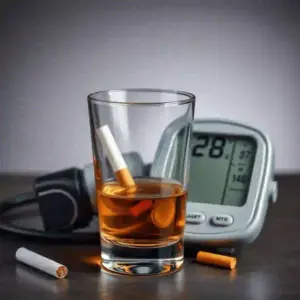Advanced Gastrointestinal (GI) Diagnostic Services
Explore advanced GI diagnostic tests, their importance, procedures, and benefits for accurate digestive disorder detection.

GI Diagnostics
The gastrointestinal (GI) system plays a vital role in digestion, absorption, and maintaining overall health. However, disorders in this system can lead to a wide range of symptoms—from mild discomfort to life-threatening conditions. GI Diagnostics refers to specialized tests and imaging techniques used to detect, evaluate, and monitor diseases affecting the esophagus, stomach, intestines, liver, pancreas, and gallbladder.
At VS Hospitals, the Gastroenterology Department is equipped with world-class diagnostic facilities and cutting-edge technology to detect GI conditions at their earliest stages. The expert team focuses on accurate diagnosis, patient comfort, and evidence-based evaluation to guide effective treatment plans for every patient.

Early Detection Saves Lives
Early detection and treatment are crucial for improving the chances of survival. If you notice any concerning symptoms, consult a healthcare provider immediately.
Signs and Symptoms
Persistent abdominal pain
Can signal ulcers, gastritis, or bowel disorders.
Heartburn or acid reflux
Indicates potential gastroesophageal reflux disease (GERD).
Nausea and vomiting
May result from infection, obstruction, or digestive malfunction.
Diarrhea or constipation
Common symptoms of IBS, infection, or inflammatory bowel disease.
Blood in stools or vomit
Suggests GI bleeding that requires urgent evaluation.
Loss of appetite
Possible indicator of ulcers, cancer, or malabsorption.
Fatigue and anemia
May occur due to chronic bleeding or nutritional deficiencies.
Jaundice (yellowing of skin/eyes)
Linked to liver or bile duct problems.
Blood in Urine
Hematuria - pink, red, or dark urine, the most common symptom
Frequent Urination
Feeling the need to urinate frequently, even when bladder is not full
Painful Urination
Experiencing pain or burning sensation while urinating
Back or Pelvic Pain
Pain that occurs as the cancer grows and spreads
Unexplained Weight Loss
Significant weight loss not related to diet or exercise
Fatigue
Feeling unusually tired or weak without a clear cause
Timely investigation through GI diagnostic tests at VS Hospitals helps in identifying these underlying causes and preventing serious complications.
Meet Our Expert GI Diagnostic Specialists
Risk Factors
Smoking
Smoking is one of the leading causes of bladder cancer. Chemicals in tobacco smoke can damage the lining of the bladder, increasing the risk.

Gender
Men are at a higher risk of developing bladder cancer than women.

Chronic Bladder Infections or Inflammation
Conditions such as bladder infections and long-term bladder inflammation can increase the risk.

Exposure to Chemicals
Prolonged exposure to certain chemicals, especially those used in the dye industry, rubber production, and chemical manufacturing, increases the risk.

Unhealthy eating habits
High-fat, spicy, or processed foods contribute to acid reflux and ulcers.

Smoking and alcohol use
Damages the digestive tract lining and impairs liver function.

Obesity
Increases pressure on the stomach and worsens GERD symptoms.

Sedentary lifestyle
Slows down digestion and contributes to constipation.

Stress
Triggers acid production and disrupts gut motility.

Long-term medication use
Drugs such as NSAIDs or steroids can cause gastritis or ulcers.

Family history
Inherited digestive conditions or colon cancer risk.

Age
Older adults are more prone to digestive diseases, including polyps and gallstones.

GI Diagnostics
Diet and Nutrition
Prevention
Diagnosis
Key Services
Key Facilities
Dietary patterns have a significant impact on digestive health and diagnostic results. The nutrition specialists at VS Hospitals provide guidance before and after GI procedures to ensure accurate outcomes and faster recovery.
- Pre-Test Guidelines: Patients may be advised to fast or follow a clear-liquid diet before tests like endoscopy or colonoscopy.
- Hydration: Staying hydrated ensures smoother bowel movements and better test preparation.
- Fiber-Rich Foods: Fruits, vegetables, and whole grains promote healthy digestion and prevent constipation.
- Avoid Gas-Producing Foods: Limit beans, cabbage, and carbonated drinks before diagnostic procedures.
- Balanced Meals: Include lean proteins, probiotics, and complex carbohydrates for digestive strength.
- Post-Diagnostic Care: Soft foods like rice porridge, soups, and yogurt are recommended after endoscopy.
- Avoid Spicy and Fried Foods: Reduces irritation in the stomach lining during healing.
- Limit Caffeine and Alcohol: Prevents acid build-up and supports liver health.
- Small Frequent Meals: Keeps digestion steady and prevents bloating.
- Follow Dietitian Advice: VS Hospitals’ gastro dietitians craft personalized plans that complement each patient’s test results and health status.
A proper diet not only enhances diagnostic accuracy but also supports long-term gastrointestinal wellness.
Preventing GI disorders starts with conscious lifestyle changes and regular health check-ups. The GI specialists at VS Hospitals emphasize proactive care through education and awareness.
- Eat a Balanced Diet: Include fiber, probiotics, and antioxidants.
- Stay Active: Regular exercise supports bowel regularity and metabolism.
- Avoid Self-Medication: Overuse of painkillers and antacids can mask underlying issues.
- Quit Smoking and Alcohol: These are key triggers for ulcers and reflux.
- Manage Stress: Practice mindfulness, meditation, or yoga for digestive balance.
- Routine Screening: Periodic endoscopy, colonoscopy, or liver function tests can detect early signs of disease.
- Stay Hydrated: Water aids digestion and toxin elimination.
- Follow Proper Eating Habits: Eat on time, chew thoroughly, and avoid late-night meals.
- Monitor Symptoms: Seek prompt evaluation if you notice recurring indigestion or bowel changes.
- Annual GI Health Check-Up: Offered at VS Hospitals for preventive monitoring.
The preventive care model at VS Hospitals helps detect issues early and improve patient outcomes before complications arise.
VS Hospitals offers a full suite of advanced GI diagnostic procedures for accurate and early detection of gastrointestinal disorders. The focus is on precision, minimal discomfort, and faster results.
- Upper GI Endoscopy: A flexible camera-based tube examines the esophagus, stomach, and duodenum to detect ulcers, inflammation, or early cancer signs.
- Colonoscopy: Enables direct visualization of the colon and rectum to identify polyps, bleeding, inflammatory bowel disease, or colorectal cancer.
- Capsule Endoscopy: A pill-sized camera captures detailed images of the small intestine, ideal for diagnosing obscure bleeding or Crohn’s disease.
- Endoscopic Ultrasound (EUS): Combines ultrasound and endoscopy for high-precision imaging of digestive organs, pancreas, and bile ducts.
- ERCP (Endoscopic Retrograde Cholangiopancreatography): Specialized procedure to detect and treat bile duct stones, strictures, or pancreatic blockages.
- Advanced Imaging Studies: Ultrasound, CT, MRI, and barium tests offer detailed structural insights for accurate diagnosis of abdominal abnormalities.
- Comprehensive Laboratory Testing: Blood, stool, and urine analyses identify infections, inflammation, anemia, and liver function disorders for complete evaluation.
VS Hospitals provides comprehensive GI diagnostic services supported by expert gastroenterologists, advanced technology, and an evidence-based approach.
- Advanced Endoscopic Technology: High-definition endoscopes enable clear visualization, early detection, and therapeutic procedures like biopsy, polyp removal, and bleeding control.
- Comprehensive GI Screening: Preventive screenings for colon cancer, ulcers, and liver disorders, along with regular check-ups for chronic digestive conditions.
- Liver & Pancreas Function Evaluation: Biochemical tests assess enzyme activity and detect early-stage hepatitis, fatty liver, or pancreatitis.
- Motility & Functional Studies: Esophageal manometry, pH monitoring, and breath tests help diagnose reflux, lactose intolerance, bacterial overgrowth, and H. pylori infections.
- Cancer Detection & Monitoring: Integrated use of endoscopy, colonoscopy, and imaging ensures accurate cancer diagnosis and continuous surveillance for high-risk patients.
- Pediatric & Geriatric GI Diagnostics: Specialized, patient-friendly procedures tailored for children and seniors to address unique digestive health concerns safely and effectively.
The GI Diagnostic Unit at VS Hospitals is one of the most advanced in Chennai, offering world-class facilities designed for both diagnostic precision and patient comfort.
- State-of-the-art Endoscopy Suite: Equipped with high-definition scopes and real-time imaging technology.
- Robotic and Laparoscopic Units: For minimally invasive diagnostic and therapeutic interventions.
- 24/7 Emergency Gastroenterology Care: Immediate support for acute abdominal pain, bleeding, or obstruction.
- Advanced Imaging Department: Includes ultrasound, MRI, and CT scan for comprehensive abdominal analysis.
- Dedicated Laboratory Services: On-site testing for liver function, infection markers, and stool analysis.
- Post-Procedure Recovery Rooms: Comfortable spaces for patient monitoring after diagnostics.
- Integrated ICU & Emergency Support: For high-risk or critically ill patients needing immediate attention.
- Expert Gastroenterologists and Technicians: Skilled professionals ensuring safe and accurate procedures.
- Patient Education and Counseling: Guidance on preventive care and lifestyle adjustments based on diagnostic findings.
With these facilities, VS Hospitals stands as a leader in GI diagnostics, combining technology, experience, and compassion to deliver the highest standards of healthcare.
Top Medical Facilities at Our Multispeciality Hospital – Here’s What Makes Us Different!
Ready to Begin Your GI Diagnostics Care Journey?
Learn More About GI Diagnostics
Frequently Asked Questions
GI diagnostics help detect digestive diseases at early stages before symptoms worsen. At VS Hospitals, advanced tools like endoscopy, colonoscopy, and imaging help identify ulcers, infections, and cancers accurately. Early diagnosis ensures timely treatment, reduces complications, and improves long-term digestive health outcomes for patients.
No, most endoscopic procedures are minimally invasive and performed under sedation for comfort. At VS Hospitals, trained specialists use advanced scopes and sterile techniques, ensuring safety and quick recovery. Patients usually resume normal activities within a few hours, with minimal discomfort and accurate diagnostic results.
Preparation depends on the test. For endoscopy or colonoscopy, fasting and bowel cleansing may be required. The medical team at VS Hospitals provides clear pre-test instructions, ensures patient safety, and guides you through the procedure smoothly for the most accurate results and stress-free experience.
